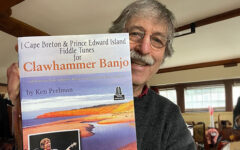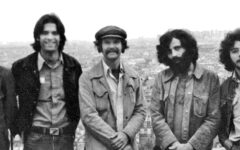While we were IBMA last week, Brance and I focused our attention on the activities at the Nashville Convention Center. Of course, many things ocurred elsewhere – in Nashville and beyond – and we’ll catch up on them over the next few days as we recover from our week at IBMA.
 One terrific bit of news came last Tuesday (9/26) when The Academy of Country Music honored Bill Monroe with a posthumous Pioneer Award. It was bestowed during the Bill Monroe Bluegrass Celebration, held at The Grand Ole Opry House during IBMA week in Nashville. James Monroe accepted the award on his father’s behalf.
One terrific bit of news came last Tuesday (9/26) when The Academy of Country Music honored Bill Monroe with a posthumous Pioneer Award. It was bestowed during the Bill Monroe Bluegrass Celebration, held at The Grand Ole Opry House during IBMA week in Nashville. James Monroe accepted the award on his father’s behalf.
Rod Essig, ACM President, shared these words in the ceremony.
"It is my honor to present this award to Bill Monroe on behalf of the Academy of Country Music. I find it fitting that we are here at the Opry, where a 28 year old Monroe was introduced by Opry founder, George D. Hay, and received not one, not two but three encores when he took the stage that evening. His pioneering sound has become legendary, and his contribution to bluegrass remains immeasurable. It is my pleasure to present Bill Monroe the Academy of Country Music’s Pioneer Award for his outstanding contribution to bluegrass."
Opry VP and General manager Pete Fisher added:
"We are pleased to join the Academy of Country Music in honoring the pioneering work of Bill Monroe by hosting this presentation of the Pioneer Award on the Opry stage as part of our annual Bill Monroe Bluegrass Celebration. Although he left us just over 10 years ago, his name and his music can be heard almost every weekend at the Opry."
In a related bit of news, an historical marker was unveiled at The Ryman Auditorium on Friday (9/29), designating it as the birthplace of bluegrass music. The text of the marker reads:
In December 1945, Grand Ole Opry star Bill Monroe and his mandolin brought to the Ryman Auditorium stage a band that created a new American musical form. With the banjo style of Earl Scruggs and the guitar of Lester Flatt, the new musical genre became known as “Bluegrass.” Augmented by the fiddle of Chubby Wise and the bass of Howard Watts (also known as Cedric Rainwater), this ensemble became known as “The Original Bluegrass Band,” which became the prototype for groups that followed.
There is a more detailed story that ran in The Tennessean over the weekend.







